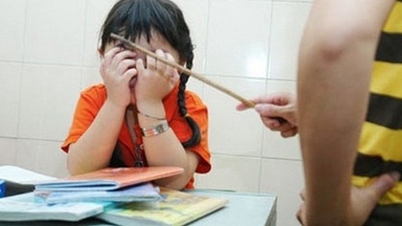GĐXH - Many parents often help their children study and do homework, however, the majority make the 11 mistakes below that make their children's learning ineffective.
1. Complaining about homework
In front of children, parents should not complain about their children's homework being too much and too difficult.
If parents feel that homework is beyond their child's ability, they can talk to the teacher in charge to discuss.
At home, parents should respect what teachers have assigned to their children and encourage them to try their best to do what has been assigned.

Many parents see that their children have a lot of homework and difficult exercises, so they do it for them. This is something they absolutely should not do. Illustrative photo
2. Inconsistency
Encourage your child to set a specific time to do homework and stick to it. They should do their homework at the same time and in the same place.
Studies show that children will work effectively and concentrate if activities are repeated habitually.
3. Frequently reprimand and criticize
"I can't do anything right!"
"Can't you do well in just studying?"
Those are the "catchphrases" of many parents when they are not satisfied with their children's academic performance.
Because of the mentality of placing importance on achievements, many parents always have the habit of scolding, even bringing up academic results to discuss every problem, finding ways to criticize children on many other unrelated aspects.
Scolding is the most wrong educational method that can quickly destroy your child's educational career.
Because the scolding of parents will hinder the positive learning, making children lose interest in studying.

Scolding is the most wrong educational method that can quickly destroy your child's educational career. Illustration photo
4. Misunderstanding the nature of homework
Many parents think that homework is a way for their children to acquire new knowledge, but in fact, homework helps children consolidate knowledge learned in class.
And more than anything, homework is an opportunity for children to learn how to work independently and autonomously. Many parents tend to turn homework time into a debate.
However, give your child quiet time to work through the problems in his homework.
If your child encounters a difficult problem, parents can give some small hints so that they can solve the exercise themselves.
5. Put pressure on homework
If you sign your child up for too many extracurricular activities, it can lead to a huge amount of homework, which can put a strain on their time and mental energy.
You should discuss with your child to choose appropriate extracurricular activities and cancel unnecessary activities.
At home, allow your child to relax or take breaks during homework time. Don’t rush your child through homework as they can only work effectively when they are well rested.
6. Constantly urging and complaining
Just seeing their children having free time or entertainment, many parents will constantly urge and complain, and the content of their words always focuses on studying. For example:
"You've played enough, go do your homework now!".
"Stop watching TV and do your homework!"
This habit of complaining and urging is not only useless but also makes children think negatively: "The more parents force, the less they want to study!"
As a result, students will develop a mentality of opposing studying, studying perfunctorily and perfunctorily.
7. Absolute control
If your child asks you to help with their homework, don't rush to help when they first encounter difficulties.
Children need to have time to think carefully, try at least 1-2 methods before seeking help. This way, they will learn to think and deal with problems on their own.
Before helping, ask your child how he or she understands the assignment, what methods he or she has tried, and discuss new approaches together.
If your child is afraid of being scolded for expressing his/her opinion, you should encourage him/her to confidently present it whether it is right or wrong.

If your child asks you to help with their homework, don't rush to help them when they first encounter difficulties. Illustration photo
8. Getting an "A" in school is good, a "C" is bad
Pressuring your child to always get an "A" in all subjects can make him or her feel anxious and pressured.
What parents need to do is explain to their children that failure is not a bad thing and that they are still listened to and loved by their parents in all situations.
Clinical psychologist Dr. Stephanie O'Leary believes that failure can sometimes be beneficial for children. This will teach them how to deal with negative situations, gain life experience and help them find solutions in difficult situations without fear of failure.
9. Ignoring children
When children ask you for help with their homework, it shows that they are struggling and trying to improve their abilities.
Don't ignore your child's wishes. It's okay to help your child with homework, just don't do it for him.
10. Evaluate the quality of the assignment
You should not complain or question the amount of homework assigned by the teacher. If you think the homework is more difficult than your child's current level, you can privately make a complaint to the teacher.
However, if the assignment is appropriate for your child's level, help him or her complete it without complaining.
Complaints and criticism from parents can directly affect children's attitudes and motivation to learn.
Discussions should take place privately between parents and teachers, schools, when children are not present.

You should not complain or doubt the amount of homework assigned by your teacher. Illustration photo
11. Do your child's homework
Helping and doing things for your child are two different things. You can teach your child, but don’t do it for him. If you do it for him, he won’t understand what the teacher is trying to convey.
It also makes children passive, dependent, and contemptuous of learning.
What parents should do is encourage their children to try their best. If they cannot do it, you can give them some brief instructions, leaving them some "gaps" for them to think.
The best way is to let your child solve the exercise by himself. When he cannot do it or does it wrong, remind him to listen carefully to the teacher's correction and try to do it by himself later.
12. Study anywhere
When helping children with homework, parents should choose a fixed study location such as the child's own room or desk.
You should not cook and then tell your child to study at the kitchen table and lecture because both of you cannot concentrate, affecting the progress of the homework and the child's learning.
Criteria for organizing an effective study corner include: enough light, airy, and minimal noise.
Source: https://giadinh.suckhoedoisong.vn/11-sai-lam-cua-cha-me-khi-kem-con-hoc-o-nha-khien-tre-cang-hoc-cang-kem-172250118153919913.htm


![[Photo] Urgently help people soon have a place to live and stabilize their lives](/_next/image?url=https%3A%2F%2Fvphoto.vietnam.vn%2Fthumb%2F1200x675%2Fvietnam%2Fresource%2FIMAGE%2F2025%2F12%2F09%2F1765248230297_c-jpg.webp&w=3840&q=75)










































































![[Photo] General Secretary To Lam works with the Standing Committees of the 14th Party Congress Subcommittees](https://vphoto.vietnam.vn/thumb/402x226/vietnam/resource/IMAGE/2025/12/09/1765265023554_image.jpeg)


































Comment (0)